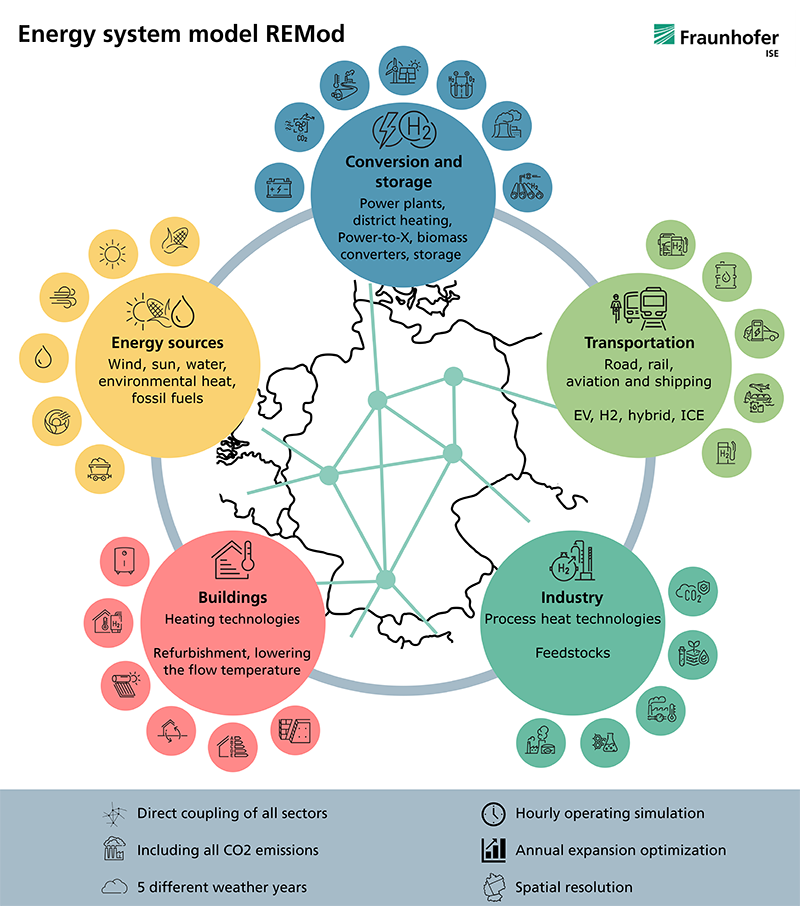| Duration: | 09/2023 - 08/2026 |
| Contracting Authority/ Sponsors: | Federal Ministry of Economic Affairs Education and Research (BMWF) |
| Project Partners: | Brandenburgische Technische Universität Cottbus-Senftenberg | Hertie School gemeinnützige GmbH | Deutsches Institut für Wirtschaftsforschung | Adelphi Research gemeinnützige GmbH | Technische Universität Berlin | Ecologic Institut gemeinnützige GmbH | Stiftung Wissenschaft und Politik (SWP) | Mercator Research Institute on Global Commons and Climate Change (MCC) gemeinnützige GmbH | Universität Potsdam | Potsdam-Institut für Klimafolgenforschung e. V.| Helmholtz-Zentrum Potsdam | Deutsches Geo Forschungs Zentrum GFZ | Universität Greifswald | Universität Hamburg | RWI - Leibniz-Institut für Wirtschaftsforschung e. V. | Universität Duisburg-Essen, Institut der deutschen Wirtschaft Köln e.V. | Deutsches Zentrum für Luft- und Raumfahrt e.V. | Technische Universität Darmstadt | ZEW - Leibniz Zentrum für Europäische Wirtschaftsforschung GmbH Mannheim | Universität Stuttgart | Öko-Institut. Institut für angewandte Ökologie e.V. | Technische Universität München (TUM) | Fraunhofer-Gesellschaft zur Förderung der angewandten Forschung e.V. | ifo Institut - Leibniz-Institut für Wirtschaftsforschung an der Universität München e.V. | Technische Universität Nürnberg | Julius-Maximilians-Universität Würzburg | Stiftung Umweltenergierecht |
| Website: | Kopernikus-Project »Ariadne« |
| Project Focus: |
Kopernikus-Ariadne2
Evidence-Based Assessment for Shaping the German Energy Transition on the Path to Climate Neutrality
Shaping the energy transition is the subject of a comprehensive research process that brings together 27 research institutions in the “Ariadne” project. ARIADNE is one of four Kopernikus projects funded by the Federal Ministry of Education and Research (BMBF). During the three-year term of the project, research will be conducted into which policy instruments are suitable for achieving the goals of the Paris Climate Protection Agreement. From a better understanding of the impact of individual political measures and policy paths to an overview of the overall system - together with stakeholders from politics, the energy transition and society, the project is investigating sensible strategies for the energy transition and their acceptance by citizens. The project continuously compiles findings and results on a multimedia website.
Who is Ariadne? In Greek mythology, the legendary hero Theseus was able to navigate safely through the Minotaur's labyrinth thanks to Ariadne's thread.
Based on this, the Ariadne project aims to provide an overall picture: in terms of Germany's path to climate neutrality by 2045 and climate protection, the energy transition is a necessity. At the same time, the transformation process represents an opportunity for innovation, sustainable structural change and the testing of new concepts of social ownership. Due to the current energy crisis and the resulting changes in the geopolitical constellation, the transformation is taking place under fundamentally different conditions. The work of Ariadne's first funding phase, from the individual sector to the system perspective, from the German Climate Protection Act to the European Green Deal, from citizens' liberation to the exchange with political decision-makers, has revealed five central challenges for the success of the energy transition:
- the need for unprecedented acceleration and scaling of the transformation in technical, economic and social terms
- reliable and adaptable instrumentation
- dealing with scarcities and technical restrictions
- questions of distribution, social justice and social ownership and
- the need to adapt to geopolitical upheavals and uncertainties.
The aim of the proposed project is to shed light on these challenges of the energy transition in detail and to develop robust strategies for political action with which these challenges can be overcome. A joint learning process will also run like a common thread through the project in the coming funding phase in order to show ways in which obstacles can be overcome and options for overcoming multiple crises can be spelled out. Ariadne is thus responding to the call for funding for the Copernicus projects for the energy transition, which emphasizes that social, ecological and economic aspects are of great importance and that the energy transition can only succeed “if the needs and expectations of the population are adequately reflected and environmental compatibility and market economy requirements are taken into account.” Ariadne will examine the transformation in four dimensions: In the analysis of technical-economic scenarios, options for climate policy governance, suitable policy instruments and prerequisites for successful social sponsorship. In order to do justice to the identified challenges and dimensions of the energy transition, Ariadne is organizing future research in nine work packages, each focusing on one topic area.
In cooperation with its sister institutes in the Fraunhofer Cluster of Excellence CINES, Fraunhofer ISE contributes to the “Ariadne” analyses in the context of the German energy transition.
Under Sebastian Herkel and Dr. Christoph Kost, Fraunhofer ISE is leading the work package “Sectoral Focus Analysis Heat Transition”, in which challenges and solution options for the heat transition are evaluated and the systemic effect of instruments is analyzed, presented and assessed. Here, the research group at Fraunhofer ISE answers how the potential in the building sector and housing market can be implemented even better in a technology-specific and stakeholder-specific manner. To this end, a close dialog with industry stakeholders and players such as tenants and owners is planned.
In addition, Fraunhofer ISE is working on research topics relating to energy scenarios and the role and innovative power of industry in the course of the energy transition, using the REMod energy system model. In this project, Fraunhofer ISE is investigating the overall systemic and sector-coupling issues using the REMod energy system model. The research group aims to find out how policy measures and instruments can best interact in a cross-sectoral context with regard to the energy transition.
The overall management of the Ariadne project lies with Prof. Dr. Ottmar Edenhofer, Director of the Potsdam Institute for Climate Impact Research (PIK).
